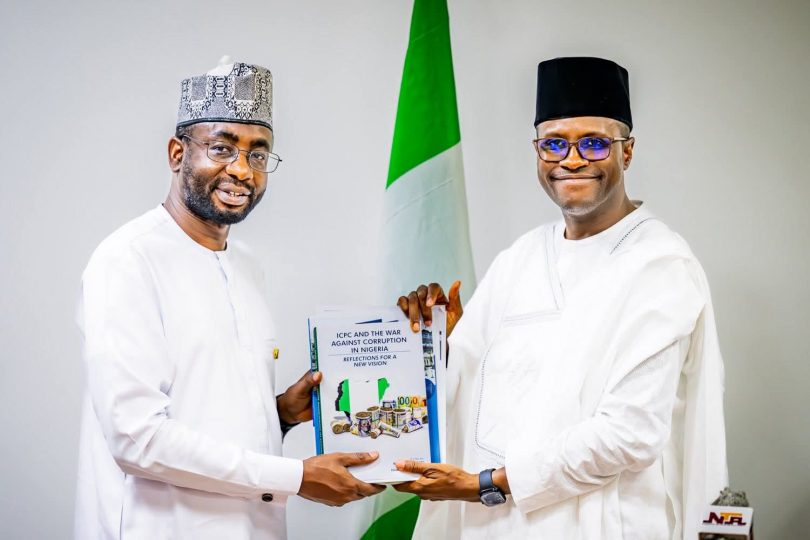The National Information Technology Development Agency (NITDA) and the Independent Corrupt Practices and Other Related Offences Commission (ICPC) have announced the establishment of a Joint Task Force on Digital Governance and Anti-Corruption, a strategic move aimed at curbing corruption in government IT projects and strengthening compliance with Nigeria’s IT Project Clearance policy.
By Chimezie Godfrey
The National Information Technology Development Agency (NITDA) and the Independent Corrupt Practices and Other Related Offences Commission (ICPC) have announced the establishment of a Joint Task Force on Digital Governance and Anti-Corruption, a strategic move aimed at curbing corruption in government IT projects and strengthening compliance with Nigeria’s IT Project Clearance policy.
The initiative, unveiled during a high-level courtesy visit by NITDA’s Director General, Kashifu Inuwa Abdullahi, CCIE, to the ICPC Chairman, Dr. Musa Adamu Aliyu, SAN, at the Commission’s headquarters in Abuja, signals a renewed commitment by both agencies to align their mandates in support of President Bola Ahmed Tinubu’s Renewed Hope Agenda.
The collaboration, they noted, is anchored on the President’s directive to build a $1 trillion economy driven by digital transformation, improved ease of doing business, and the elimination of corruption as a barrier to sustainable growth.
Over the years, billions of naira have been lost to failed or abandoned government IT projects. Many Federal Public Institutions (FPIs), according to NITDA, have bypassed the mandatory clearance process before embarking on technology procurements, resulting in duplication of efforts, inflated costs, poor technical standards, and in some cases, total project failure.
“These lapses have eroded public trust and wasted scarce resources that could have been deployed to improve service delivery and transparency,” the statement noted.
The NITDA IT Project Clearance process, designed to prevent such waste and ensure synergy in public investments, mandates that all government IT projects are properly vetted, interoperable, and deliver value for money. However, persistent non-compliance has been identified by ICPC as a corruption risk that requires urgent enforcement.
Under the new arrangement, the Joint Task Force will merge NITDA’s technical oversight with ICPC’s investigative and prosecutorial powers to ensure full compliance and accountability in public ICT investments.
Its mandate includes:
”Enforcement of IT Clearance: Ensuring all FPIs obtain NITDA’s mandatory IT Project Clearance before commencing any technology-related project, with ICPC enforcing compliance where violations occur.
”Monitoring and Sanctioning: Jointly tracking IT project implementation and sanctioning defaulting agencies in line with extant regulations.
”Integration of Enforcement Tools: Embedding NITDA’s monitoring instruments into ICPC’s anti-corruption frameworks, such as the System Study & Review, Ethics & Integrity Scorecard, and other tools to institutionalize compliance”.
Speaking during the visit, NITDA DG Kashifu Inuwa Abdullahi emphasized that the IT Project Clearance framework serves as a national safeguard for responsible digital spending.
“The IT Clearance Regulation is designed to ensure that government IT projects are properly conceptualized and executed in line with global best practices. It ensures value-for-money investments, reduces duplication, and creates a unified digital government,” he said.
He explained that beyond enforcing compliance, the policy ensures that public funds are optimally utilized and that digital projects deliver real value to citizens.
In his remarks, ICPC Chairman Dr. Musa Adamu Aliyu, SAN, hailed the collaboration as timely and essential for Nigeria’s digital future.
“Corruption in IT procurement undermines both public trust and economic progress. The Commission is ready to deploy its statutory powers to support NITDA’s mandate and hold both contractors and public officials accountable,” he stated.
Both leaders expressed optimism that the Joint Task Force would serve as a model for inter-agency collaboration, ensuring that Nigeria’s digital transformation agenda is transparent, efficient, and aligned with global standards.
They affirmed that the initiative marks a decisive step toward addressing systemic corruption risks in public IT investments while promoting integrity, accountability, and good governance in the digital sector.

